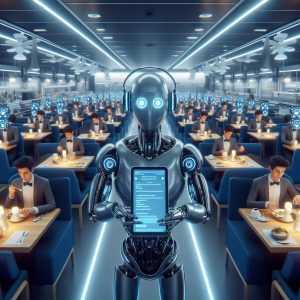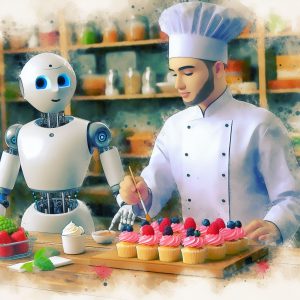Artificial intelligence (AI) is rapidly changing the world as we know it, and the culinary world is no exception. From AI-powered kitchen appliances to AI-driven recipe generation and creation, it is clear that AI is having a major impact on the way we cook and eat.
AI-Powered Kitchen Appliances
One of the most visible ways that AI is changing the culinary world is through the development of AI-powered kitchen appliances. These appliances use a variety of sensors and algorithms to automate and optimize the cooking process, making it easier for home cooks to create delicious meals.
For example, the Smarter Fridge is a refrigerator that uses AI to track the food inside and suggest recipes based on what’s available. The June Oven is a smart oven that uses AI to automatically adjust cooking times and temperatures based on the food being cooked. And the Hestan Cue is a smart cooktop that uses AI to control the temperature of each burner, ensuring that food is cooked evenly and consistently.
AI-Driven Recipe Generation and Creation
AI is also being used to develop new and innovative recipes. AI-powered recipe generators can create recipes from scratch, or they can be used to modify existing recipes to suit the dietary needs or preferences of a particular user.
For example, the IBM Watson Recipe Generator can create recipes based on a variety of criteria, such as ingredients, dietary restrictions, and cooking time. The Foodpairing app can suggest flavor combinations based on the ingredients that you have on hand. And the Yummly app can create personalized recipes based on your food preferences and dietary goals.
The Changing Face of Fine Dining
AI is also having a major impact on the fine dining world. AI-powered systems are being used to create new and innovative dishes, and they are also being used to automate tasks such as reservations and table management.
For example, the Alinea restaurant in Chicago uses AI to create unique and avant-garde dishes. The restaurant’s chefs use AI to generate new flavor combinations and textures, and they also use AI to control the temperature and humidity of the dining room.
The use of AI in the culinary world is still in its early stages, but it is clear that AI has the potential to revolutionize the way we cook and eat. AI-powered kitchen appliances, AI-driven recipe generation and creation, and AI-enabled fine dining experiences are just a few of the ways that AI is changing the culinary world.
As AI continues to develop, it is likely that we will see even more innovation in the culinary world. AI has the potential to make cooking easier, more efficient, and more enjoyable for everyone. It is also possible that AI could lead to the development of new and exciting food experiences that we can’t even imagine today.
Dangers for Chefs in the Food Industry:
-
Repetitive Tasks: Chefs often perform repetitive tasks such as chopping, slicing, and stirring, which can lead to muscle strain, pain, and injuries.
-
Kitchen Hazards: Working in a kitchen involves exposure to sharp knives, hot surfaces, and open flames, which can cause accidents and burns.
-
Long and Irregular Hours: Chefs often work long and irregular hours, including weekends and holidays, which can lead to fatigue, stress, and difficulty maintaining a work-life balance.
-
Hot and Humid Conditions: Kitchens are often hot and humid due to the use of ovens, stoves, and grills, which can be uncomfortable and lead to heat exhaustion.
-
Physical Demands: Chefs are required to stand for long periods, lift heavy pots and pans, and work in cramped spaces, which can be physically demanding and lead to back pain and other injuries.
Possibilities of Chef Jobs Being Replaced by AI:
-
Routine Tasks: AI-powered machines can be programmed to perform routine tasks such as chopping, slicing, and mixing, freeing up chefs to focus on more creative and strategic aspects of cooking.
-
Precision and Consistency: AI can provide precise and consistent results, ensuring that dishes are prepared to exact specifications every time.
-
Speed and Efficiency: AI-powered machines can work faster and more efficiently than humans, reducing the time it takes to prepare dishes and increasing productivity.
-
Food Safety and Quality Control: AI can monitor food safety and quality standards, reducing the risk of contamination and ensuring that dishes are prepared to a high standard.
-
Innovation and Creativity: AI can also be used to generate new and innovative recipes, helping chefs to stay ahead of the curve and create unique dining experiences.
How AI Will Be Used to Help Chefs in Their Jobs:
-
Kitchen Assistants: AI-powered kitchen assistants can help chefs with tasks such as measuring ingredients, setting timers, and providing cooking instructions, making the cooking process more efficient and error-free.
-
Recipe Generation: AI can be used to generate new and innovative recipes based on a chef’s preferences and the ingredients available, helping them to create unique and memorable dishes.
-
Food Safety and Quality Control: AI can monitor food safety and quality standards, alerting chefs to potential hazards and ensuring that dishes are prepared to a high standard.
-
Dietary Recommendations: AI can provide dietary recommendations to customers based on their health goals and preferences, helping chefs to create personalized and healthy menus.
-
Cooking Techniques and Tips: AI can provide chefs with cooking techniques and tips, helping them to improve their skills and create more delicious and visually appealing dishes.
How Chefs Can Adapt to the Changing Landscape:
-
Upskill and Reskill: Chefs should invest in upskilling and reskilling to learn new skills and technologies that are in demand in the changing food industry.
-
Embrace AI and Automation: Chefs should embrace AI and automation as tools that can help them to work more efficiently, improve food quality and safety, and stay ahead of the competition.
-
Focus on Creativity and Innovation: Chefs should focus on developing their creativity and innovation skills to create unique and memorable dishes that set them apart from the competition.
-
Maintain a Positive Attitude: Chefs should maintain a positive attitude and see the changes in the food industry as an opportunity to learn, grow, and adapt.
-
Network and Collaborate: Chefs should network with other chefs, food professionals, and technology experts to stay informed about the latest trends and developments in the industry.



